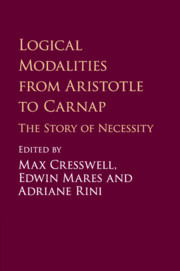Book contents
- Frontmatter
- Contents
- List of Figures and Tables
- List of Contributors
- List of Abbreviations
- Introduction
- 1 Aristotle on the Necessity of the Consequence
- 2 Aristotle on One- Sided Possibility
- 3 Why Does Aristotle Need a Modal Syllogistic?
- 4 Necessity, Possibility, and Determinism in Stoic Thought
- 5 Necessity in Avicenna and the Arabic Tradition
- 6 Modality without the Prior Analytics: Early Twelfth Century Accounts of Modal Propositions
- 7 Ockham and the Foundations of Modality in the Fourteenth Century
- 8 Theological and Scientific Applications of the Notion of Necessity in the Mediaeval and Early Modern Periods
- 9 Locke and the Problem of Necessity in Early Modern Philosophy
- 10 Leibniz's Theories of Necessity
- 11 Leibniz and the Lucky Proof
- 12 Divine Necessity and Kant's Modal Categories
- 13 Charles Sanders Peirce on Necessity
- 14 The Development of C. I. Lewis's Philosophy of Modal Logic
- 15 Carnap's Modal Predicate Logic
- Bibliography
- Index
2 - Aristotle on One- Sided Possibility
Published online by Cambridge University Press: 05 September 2016
- Frontmatter
- Contents
- List of Figures and Tables
- List of Contributors
- List of Abbreviations
- Introduction
- 1 Aristotle on the Necessity of the Consequence
- 2 Aristotle on One- Sided Possibility
- 3 Why Does Aristotle Need a Modal Syllogistic?
- 4 Necessity, Possibility, and Determinism in Stoic Thought
- 5 Necessity in Avicenna and the Arabic Tradition
- 6 Modality without the Prior Analytics: Early Twelfth Century Accounts of Modal Propositions
- 7 Ockham and the Foundations of Modality in the Fourteenth Century
- 8 Theological and Scientific Applications of the Notion of Necessity in the Mediaeval and Early Modern Periods
- 9 Locke and the Problem of Necessity in Early Modern Philosophy
- 10 Leibniz's Theories of Necessity
- 11 Leibniz and the Lucky Proof
- 12 Divine Necessity and Kant's Modal Categories
- 13 Charles Sanders Peirce on Necessity
- 14 The Development of C. I. Lewis's Philosophy of Modal Logic
- 15 Carnap's Modal Predicate Logic
- Bibliography
- Index
Summary
The term ‘possible’, in Aristotle's view, is ambiguous. It has two senses, known as one-sided possibility and two-sided possibility (or contingency). Being two-sided possible means being neither impossible nor necessary, and being one-sided possible simply means being not impossible. Aristotle defines the two senses in Prior Analytics 1.13 (32a18–21). This definition is followed by a controversial passage which states several equivalences between modal expressions (32a21–28). It is often thought that this passage is spurious and should be excised even though it is found in all manuscripts. I argue that the passage is not spurious, but contains a coherent argument justifying the one-sided sense of ‘possible’ (Section 1). This argument follows a pattern of proof explained by Aristotle elsewhere in the Prior Analytics and De caelo (Section 2). Moreover, it is closely related to a similar argument concerning one-sided possibility in De interpretatione 13 (Section 3). Examining this latter argument will help us better understand the controversial passage in Prior Analytics 1.13 (Section 4).
The Problematic Passage
At the beginning of Prior Analytics 1.13, Aristotle introduces the two senses of ‘possible’ as follows:
[i] I use the expressions ‘to be possible’ and ‘what is possible’ in application to something if it is not necessary but nothing impossible will result if it is put as being the case; [ii] for it is only equivocally that we say that what is necessary is possible.(An. Pr. 1.13 32a18–21)
In point [i] of this passage, Aristotle characterizes two-sided possibility. Something is two-sided possible just in case it is not necessary and nothing impossible results from putting it as being the case. This characterization involves the term ‘impossible’. Unlike ‘possible’, ‘impossible’ is not ambiguous in the Prior Analytics but is consistently used in the sense of ‘not one-sided possible’ as opposed to ‘not two-sided possible’. Aristotle takes the condition that nothing impossible results from putting X as being the case to be equivalent to the condition that X is not impossible. Thus, he holds that something is two-sided possible just in case it is neither necessary nor impossible.
In point [ii] of the passage, Aristotle turns to one-sided possibility. He does not offer an explicit definition of one-sided possibility, but characterizes it by pointing out the specific case of application that distinguishes it from two-sided possibility.
- Type
- Chapter
- Information
- Logical Modalities from Aristotle to CarnapThe Story of Necessity, pp. 29 - 49Publisher: Cambridge University PressPrint publication year: 2016
- 1
- Cited by



